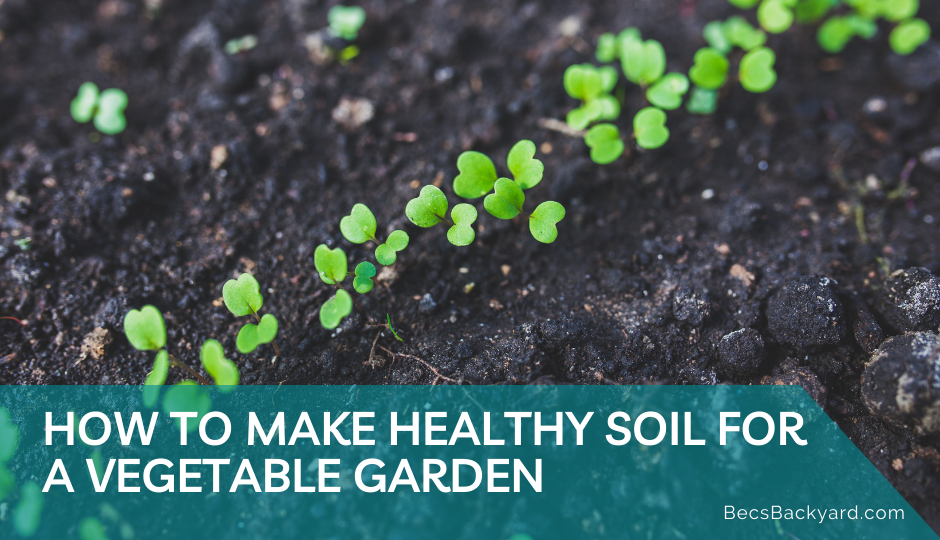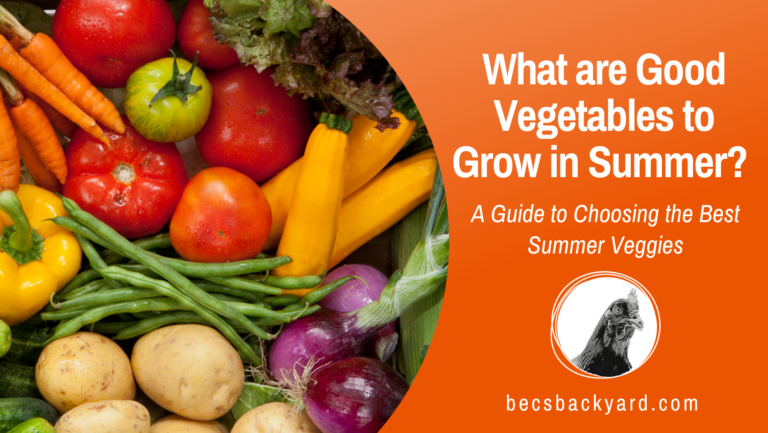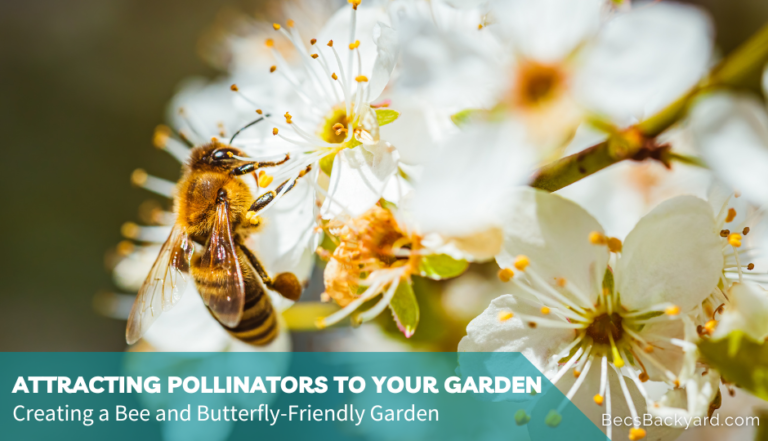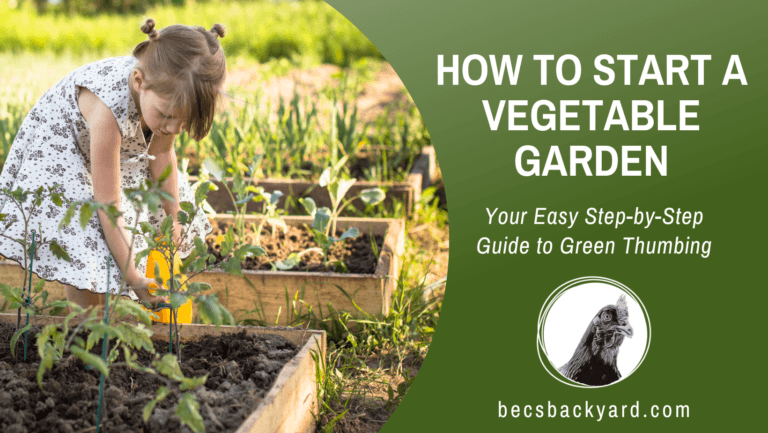What is the Best Mulch for Vegetable Gardens?
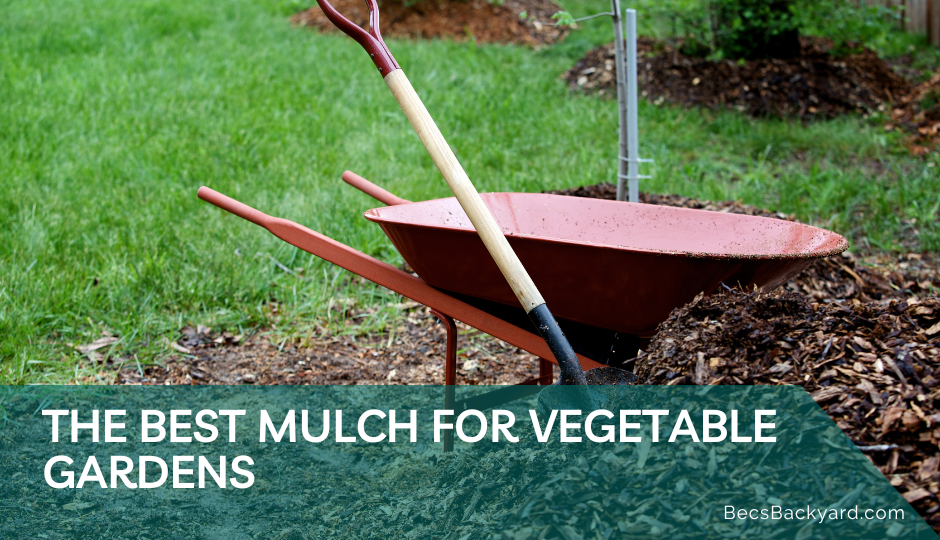
Mulch plays a critical role in maintaining the health of your vegetable garden. It helps to regulate soil temperature, retain moisture, and suppress weed growth. There are many different types of mulch available, each with its own unique set of advantages and disadvantages.
Keep reading to learn more about two categories of mulch:
Organic
When it comes to choosing the best mulch for vegetable gardens, there are several factors to consider. Natural mulches like straw, grass clippings, and leaves are great for adding organic matter to the soil as they break down. However, they can also attract pests and harbor diseases if not properly composted beforehand.
Inorganic
Synthetic mulches like plastic and landscape fabric are effective at suppressing weeds, but they don’t add any nutrients to the soil and can be difficult to remove once they start to break down.
Keep reading to find the best solution for your gardens.
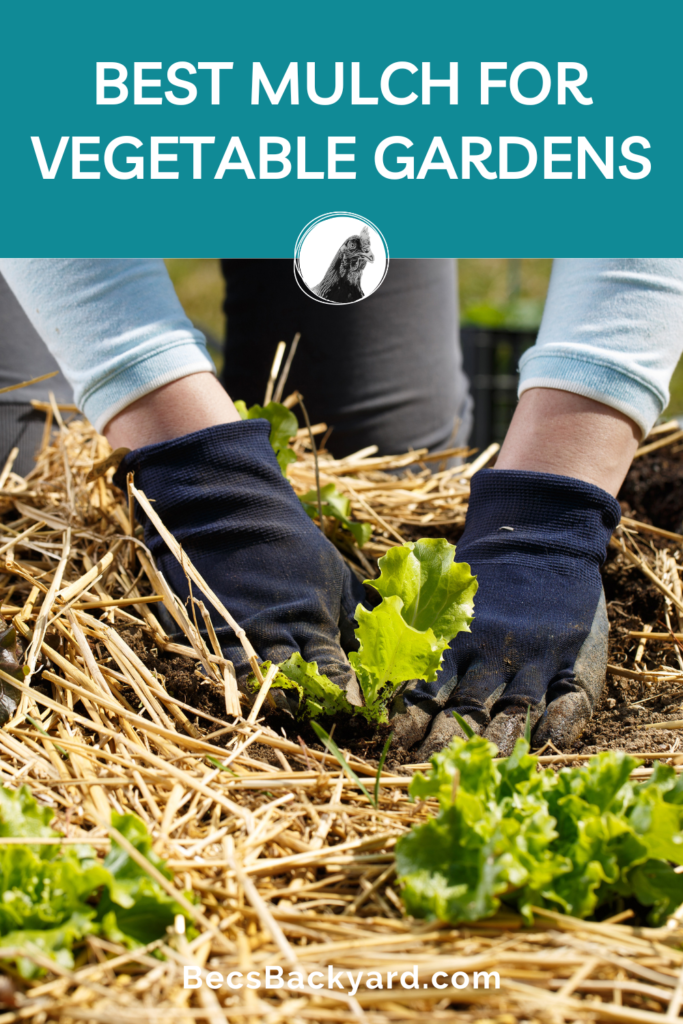
Importance of Mulching in Vegetable Gardens
Mulching is an essential practice for maintaining a healthy and productive vegetable garden. Mulch is a layer of organic or inorganic material that is applied to the soil surface around plants. There are several benefits to mulching which is why it is important to find the best mulch for vegetable gardens so you can maximize the results:
- Weed suppression: Mulch can help to prevent weeds from growing in your vegetable garden. By blocking sunlight, it reduces weed germination and growth. This not only saves time and effort in weeding, but it also helps to conserve soil moisture and nutrients that would otherwise be taken up by weeds.
- Soil moisture retention: Mulch helps to keep the soil moist by reducing water evaporation from the soil surface. This is especially important during hot and dry weather conditions when the soil can quickly dry out.
- Soil temperature regulation: Mulch helps to regulate soil temperature by insulating the soil from extreme heat or cold. This creates a more stable environment for plant growth, which can lead to better yields and healthier plants.
- Soil nutrient conservation: Mulch can help to conserve soil nutrients by preventing them from being washed away by rain or irrigation. It also provides a slow-release source of nutrients as it decomposes over time.
- Aesthetics: Mulch can also improve the appearance of your vegetable garden by creating a neat and tidy appearance. It can be used to create defined pathways or to highlight certain plants or features in your garden.
Overall, mulching is an easy and effective way to maintain a healthy and productive vegetable garden. By suppressing weeds, retaining soil moisture, regulating soil temperature, conserving soil nutrients, and improving aesthetics, mulch provides numerous benefits to your garden.
The Best Mulch for Vegetable Gardens – what types are there?
When it comes to choosing the right type of mulch for your vegetable garden, there are two main categories to consider: organic and inorganic mulch. Both types of mulch have their advantages and disadvantages, so it’s important to choose the one that best suits your needs.
Organic Mulch
Organic mulch is made from natural materials that decompose over time, adding nutrients to the soil and improving its structure. Some of the most popular types of organic mulch for vegetable gardens include:
Straw: Straw is a popular choice for vegetable gardens because it’s easy to find, inexpensive, and breaks down quickly. It also helps to keep the soil moist and cool, which is important for many types of vegetables.
Grass Clippings: Grass clippings are another great option for vegetable gardens. They’re rich in nitrogen, which is essential for plant growth, and they break down quickly, adding valuable nutrients to the soil.
Leaves: Leaves are an excellent source of organic matter, and they’re easy to collect in the fall. They help to suppress weeds, retain moisture, and improve soil structure.
Inorganic Mulch
Inorganic mulch is made from non-natural materials that don’t decompose over time. While they don’t add nutrients to the soil, they do help to suppress weeds and retain moisture. Some of the most popular types of inorganic mulch for vegetable gardens include:
Plastic: Plastic mulch is a popular choice for vegetable gardens because it’s easy to install and helps to retain moisture. It also helps to suppress weeds, which can be a major problem in many gardens.
Gravel: Gravel mulch is another popular option for vegetable gardens. It helps to retain moisture and suppress weeds, and it looks attractive in the garden.
Landscape Fabric: Landscape fabric is a synthetic material that’s designed to suppress weeds and retain moisture. It’s easy to install and can last for several years, making it a good choice for low-maintenance gardens.
When choosing the right type of mulch for your vegetable garden, it’s important to consider your specific needs and preferences. Organic mulch is a great choice for those who want to add nutrients to the soil, while inorganic mulch is ideal for those who want to suppress weeds and retain moisture.
Factors to Consider When Choosing Mulch
When it comes to choosing the best mulch for your vegetable garden, there are several factors to consider. Here are some of the most important ones:
Climate
The climate in your area plays a big role in determining the type of mulch that will work best in your vegetable garden. For example, if you live in a hot and dry climate, you may want to use a mulch that helps retain moisture in the soil, such as straw or shredded leaves. On the other hand, if you live in a cooler climate with lots of rain, you may want to use a mulch that allows for good drainage, such as wood chips or bark.
Soil Type
The type of soil in your vegetable garden is another important factor to consider when choosing mulch. If you have heavy clay soil that tends to become compacted easily, you may want to use a lightweight mulch that won’t add too much weight to the soil, such as straw or grass clippings. If you have sandy soil that tends to dry out quickly, you may want to use a mulch that helps retain moisture, such as wood chips or compost.
Vegetable Type
Different types of vegetables have different needs when it comes to mulch. For example, tomatoes and peppers prefer a warm soil, so you may want to use a dark-colored mulch that absorbs heat, such as black plastic or rubber mulch. Other vegetables, such as lettuce and spinach, prefer cooler soil, so you may want to use a lighter-colored mulch that reflects heat, such as straw or shredded leaves.
Ultimately, the best mulch for your vegetable garden will depend on a variety of factors, including your climate, soil type, and the types of vegetables you are growing. By considering these factors and choosing the right mulch for your garden, you can help ensure that your vegetables grow strong and healthy all season long.
How to Apply Mulch to Vegetable Gardens
Mulching is a great way to maintain a healthy, weed-free vegetable garden. Here are some steps to follow when applying mulch to your garden:
- Prepare the soil: Before applying mulch, it is essential to prepare the soil by removing any weeds and debris. You can also add compost or fertilizer to the soil to improve its nutrient content.
- Choose the right type of mulch: There are many types of mulch available, including straw, grass clippings, leaves, wood chips, and compost. Choose a mulch that is appropriate for your vegetable garden and fits your budget. Natural mulches are the best option for vegetable gardens as they add nutrients to the soil as they break down.
- Apply the mulch: Apply a layer of mulch around your vegetable plants, leaving a small space around the stem to prevent rot. The mulch should be at least 2-3 inches deep to provide adequate weed suppression and moisture retention.
- Reapply as needed: Mulch will break down over time, so it is essential to check your garden regularly and reapply mulch as needed. You may need to add more mulch after heavy rains or if you notice that the mulch layer has become thin.
- Avoid over-mulching: While mulch is beneficial for your vegetable garden, too much mulch can be harmful. Over-mulching can prevent water and air from reaching the soil, leading to root rot and other problems. Make sure to apply mulch in moderation and avoid piling it up around the stems of your plants.
By following these simple steps, you can apply mulch to your vegetable garden and enjoy the many benefits it provides.
Frequently Asked Questions
What is the best mulch for a vegetable garden?
The best mulch for a vegetable garden depends on several factors, such as the climate, soil type, and the type of vegetables you are growing. However, some of the most popular mulches for vegetable gardens include straw, grass clippings, shredded leaves, and compost.
What are the benefits of using mulch in a vegetable garden?
Mulching your vegetable garden offers several benefits, including:
- Retaining moisture in the soil
- Regulating soil temperature
- Suppressing weed growth
- Reducing soil erosion
- Adding nutrients to the soil as the mulch decomposes
What type of mulch is best for tomatoes and peppers?
Tomatoes and peppers thrive in warm soil, so using a mulch that retains heat can be beneficial. Some good options for mulching tomatoes and peppers include black plastic, straw, and grass clippings.
Is wood mulch suitable for a vegetable garden?
Wood mulch can be used in a vegetable garden, but it is important to choose the right type of wood. Avoid using mulch made from pressure-treated wood, which can contain harmful chemicals. Instead, opt for natural wood mulch, such as cedar or pine.
What are the advantages of using cedar mulch in a vegetable garden?
Cedar mulch is a popular choice for vegetable gardens because it is long-lasting, naturally repels insects, and has a pleasant aroma. Additionally, cedar mulch decomposes slowly, which means it can provide nutrients to the soil over a longer period of time.
Can I make my own mulch for a vegetable garden?
Yes, you can make your own mulch for a vegetable garden. Some good options include shredded leaves, grass clippings, and compost. However, it is important to ensure that the mulch is properly decomposed before using it in your garden to avoid introducing harmful bacteria or pathogens.
Additional reading: How to Make Homemade Compost: A Simple Guide to Success
Conclusion
In conclusion, choosing the best mulch for your vegetable garden depends on your specific needs and preferences. Each type of mulch has its own advantages and disadvantages, and it’s important to consider these before making a decision.
Compost is a great all-around option that provides both nutrients and moisture retention. It’s also easy to obtain and can be made at home. Pine straw is another organic option that is effective in retaining moisture and suppressing weeds. However, it may not be readily available in all areas.
For those looking for a non-organic option, landscape fabric can be a good choice. It effectively suppresses weeds and retains moisture, but it may not provide any additional nutrients to the soil. Wood chips are another non-organic option that can be effective in suppressing weeds and retaining moisture, but they may take longer to break down and can be more difficult to obtain.
It’s important to note that some mulches, such as grass clippings and leaves, should be used with caution as they can attract pests and may contain weed seeds. Additionally, some mulches, such as black plastic, can be detrimental to the soil and should be avoided.
Overall, the best mulch for vegetable gardens will depend on your specific needs and preferences. Consider the benefits and drawbacks of each type of mulch and choose the one that will work best for your garden.


